DAVE'S DIATRY - 20 DECEMBER 2006 - JEFF BATES
JEFF BATES - ONE SECOND CHANCE
"I was young and I was stupid/ I regret it every day/ I ain't sayin' I didn't do it/ but I've paid for my mistakes." - One Second Chance - Arlis Albritton, Chris DuBois, Dave Turnbull
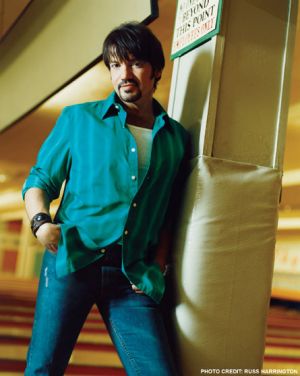 |
Mississippi
born minstrel Jeff Bates doesn't have to look far to source songs
of love, redemption and life on the cutting edge. He ploughed the heartbreak, booze, dope and poverty in his slipstream for songs on his debut disc Rainbow Man and second album Leave The Light On (BMG-RCA). At 43 the one for times wed one time convict has two stepped charts in the style of Merle Haggard, Waylon & Willie, David Allan Coe and other outlaws. "That was totally what we were going for," Bates revealed in recent interview about the love and redemption themes. "We did kind of separate the album into themes, one being love, romance, openness and the other one being redemption, which is kind of what the past five years of my life has been about." |
Bates, who
joined Mississippi National Guard at 17, harvested hay from hell in songs
dating back two decades.
His music draws from within and beyond the margins of the country music
template.
Bates first marriage, when he was 17 to a woman 9 years older, lasted
just two weeks.
Marriage number two was his longest - nine years.
Marriage three was seven years, and his last marriage was two years.
Biology was a favourite subject for Bates who was raised in backwoods
Mississippi after being given up for adoption as a baby.
He later met his birth mother, though his natural father remains a complete
mystery.
Sharecropper Ed Bates and wife Barbara adopted Jeff and he grew up in
tiny, rural hamlet Bunker Hill with the closest town of any size 20 miles
away.
Barbara, daughter of a Pentecostal preacher, raised Bates on gospel songs.
Eight brothers and sisters came along, and Ed and Barbara also took in
two cousins.
Ed Bates later became a bulldozer operator in the Columbia area.
What the Bates family lacked in material goods was made up for with abundant
love.
"I didn't know I was adopted," Jeff recalled.
"All my brothers and sisters were blond haired and blue eyed. When
I was about nine years old, I was on the school bus and somebody said,
'you know, you're not their real son. They adopted you.' It freaked me
out. I went home and asked my Mama where I'd come from.
She was always honest with me.
She told me the whole story and then she said the coolest thing. She said,
'Out of all the kids we've got, you know what makes you special?' I said,
'No, Ma'am, I don't.' She said, 'we got to pick you. The rest of 'em,
we got whatever God gave us. But we got to choose you.'"
BACKWOODS BOY
"I'm gonna light the bedroom candles/ take the phone out of the wall/ I'm gonna resurrect the love that slipped away from us." - Long Slow Kisses - Jeff Bates-Ben Hayslip - Gordon Bradbury.
"I'm
talking about where grass grew in the middle of the road we lived on,"
Bates recalled of an area where his family lived modestly.
Music was prominent in the house, particularly Grand Ole Opry songs coming
from vinyl box sets his mother mail ordered every now and then.
"She was the first person that introduced me to Conway Twitty singing
to Loretta Lynn," Bates confessed.
"I love Merle Haggard and George Jones and Kris Kristofferson. And
I love Otis Redding and Sam Cooke. None of them had real pretty voices,
but they had so much emotion they could bring a tear to your eyes."
Bates wrote Long Slow Kisses - entrée song for Leave
The Light On about a lover in Arkansas.
"It was a relationship I was in at the time," Bates recalled.
"I was headed for a songwriting meeting in Nashville. I was living
in Little Rock, Arkansas at the time. The last thing she told me before
I walked out the door was, 'I just don't feel like I'm the most important
thing in your life anymore.' And I said, 'baby, I've got to go do this.
I'm sorry. Just know that I love you." I walked out, and I got about
40 miles out of town and felt so guilty. And I realized that she was telling
the truth that I didn't make her feel that way anymore. So I turned around
and went back home."
ONE SECOND CHANCE
| What
about the dope, booze and jail song fuel for new single One Second
Chance? "It's hands down my favourite song that I've ever recorded because I think that so many people can relate to it," says Bates - one of nine children. "I can relate to it because of my personal experience with drugs and jail and making amends with everybody and learning to forgive myself." Bates' problems escalated when he moved to Nashville from Little Rock, Arkansas to chase a record deal and songwriting. |
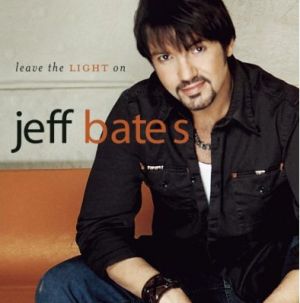 |
"I had
smoked pot and drank alcohol a little bit, but not a whole lot,"
says Bates of his pre-Nashville life captured in the song One Second
Chance.
"I can't say that I was really deep off into it. I'm celebrating
five years and a month of being clean and sober. That song means everything
to me. It means more to me than any song I've recorded just because of
my past."
DOPE DECOY
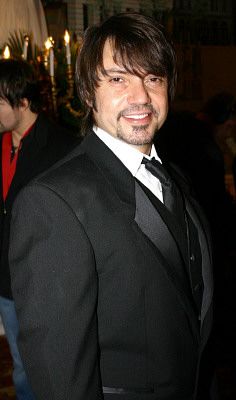 |
But
the singer who toiled as an oil rigger, carpenter, welder and construction
worker to pay the bills, descended into quicksand after being asked
by a fellow writer to try drugs. Eventually Bates faced his day in court, although he had returned some stolen items. |
"The
judge said it was unbelievable," Bates recalled.
"He said I was the worst thief he'd ever seen in his life, he'd never
seen anyone break in and then return something they'd taken."
"I wanted to feel better about me. I had been chasing the dream of
a recording deal for about 10 years, and it just wasn't happening. Failed
marriages. Divorce. I just got really got the point where I didn't like
me. I didn't like my life. I wanted some relief from that. Drugs made
me feel better temporarily. You got to understand the first time I did
it I thought I was Superman. The rest of the time, I was trying to get
back to the way I felt the first time."
"What I didn't realize was the damage you can do to yourself physically
and mentally. When you start doing it, your body immediately starts to
deteriorate because you deprive it of all the minerals and good things
you need. You don't sleep, and you don't really eat either. It's almost
like slowly going insane. Your thinking changes, behaviour changes. For
me, whatever darkness there was I had within me anyway, that really brought
it out. The more I did it, the more I withdrew from society. I kept to
myself. It was like a snowball. The more miserable you become, the more
you want to feel better and keep going back to the drugs again and again."
Bates does not run away from his past.
"I am very open about it," Bates added.
"I am honest about it. I'm not here to beat anybody over the head
with religion. I share my experience for two reasons: to keep somebody
from going down the same road I went down or if you're on the same road,
to let you know there's a way off of it out there, and there are so many
people who will help you if you're sincere and are ready to get off of
it. It's really become one of the worst drug epidemics. It's reached epidemic
proportions in our country."
THE WINGS OF MAMA'S PRAYERS
"I've
been to church on a Sunday and I've been to jail/ I put my whole family
through living hell and I've been a heavy cross to bear/ on the wings
of mama's prayers." - The Wings Of Mama's Prayers - Jeff Bates-Kris
Bergsnes-Terry Clayton.
Bates served a 96-day sentence in Tennessee's Davidson County jail from
June 2001 - a sobering sojourn.
"On March 14, 2001, I was arrested for grand theft and drug possession
and looking at a sentence of 15 years," Bates recalled.
"I went through withdrawal in my jail cell, and when I woke up seven
days later I had my first clear thought in years. After about seven days
of withdrawal and that type of thing, shakes, fever, night sweats and
all that stuff, nightmares. I had realized where I was, and I was the
reason I was there, and I deserved to be there. I had lied. I cheated
everybody I had cared about and everybody that had cared about me. I didn't
want to be that person any more."
Bates also returned to his adoptive family's gospel roots.
"The only thing I knew to do was pray," Bates added.
"I asked God for help. I got on the phone and started calling everybody
I had taken things from. I wanted everybody to know where their stuff
was and that I was the one who took it and that I was sorry.
"The coolest thing about that was everyone forgave me. Every single
person forgave me. Not only forgave me but in a lot of cases actually
tried to help me.
"That was the biggest surprise ever because I couldn't find it for
a long time in my heart to forgive myself. I felt like okay, God forgives,
me, everybody forgives me, and I was having such a hard time with hating
myself for what I had done."
"I was praying. I was talking to God. I was walking around my jail
cell one night saying 'I know you forgive me, but why can't I forgive
myself?'"
The Bible inspired Bates with such ideas as "love your neighbour
as yourself."
"I don't have the right to judge me either. I don't think He gives
us that right. That turned everything around, and I was able to let it
go. I was able to forgive myself and not condemn myself."
Bates makes it clear he didn't do it on his own.
"I don't think any of us are that strong. I had help with people
from counsellors, from people who were qualified to do that, who were
qualified to help drug addicts. I had spiritual help. I had help from
my community, my family."
The toughest part of all of this was telling his mother, Barbara, now
66, who had adopted him and made him feel a part of the family with eight
siblings.
"That's not the way she raised me," Bates revealed.
"I called her and told her. She said, 'Well, I love you, and I'll
be praying for you, and I'll see you when you get out. There was no bail.
There was no money. That was the biggest help of all, making me face the
consequences of what I had done and leaving me somewhere I couldn't get
to the drug for awhile."
Bates got his act together with the help of Kenny Beard, who produced
both of his albums and plays guitar in his band.
Bates landed his original songs on albums by Tracy Lawrence, Montgomery
Gentry and Gene Watson and also sang demos of songs sent to other artists.
SYDNEY STARMAKER TRAVIS COLLINS CUTS BATES SONG
"I lock up my old took box/ and hide all my fishing gear/ cause my in-laws are all outlaws/ but they ain't wanted here." - My In-Laws Are Outlaws - Jeff Bates-Byron Hill.
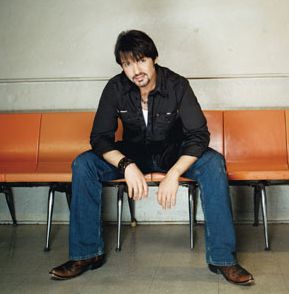 |
Sydney
country singer and Starmaker winner Travis Collins also cut Bates
song My In-Laws Have Always Been Outlaws on his debut disc
Start The Car. Gene Watson covered Would it Be Cheating (If I Still Love the Girl)? You Used to Be & The Man and Me and You. Tracy Lawrence cut What A Memory and Montgomery Gentry did Break My Heart Again and Andy Griggs and Lonestar both recorded Careful Where You Kiss Me. Bates signed with RCA Records after meeting power broker Joe Galante, who wanted to meet the voice behind all the demos of songs he had been hearing. |
That was
in January 2002.
"I told them the truth about too many marriages, drug addiction,
jail," Bates confided.
"I remember Joe Galante stood up and told me he'd call me in a few
weeks and let me know what they had decided. About 15 minutes after I
walked through the door, the phone rung. Nobody was more surprised than
me."
His first album Rainbow Man featured hits The Love Song, Long,
Slow Kisses and I Wanna Make You Cry.
Bates wrote most of the songs on the uptempo, soulful country disc and
toured to win a following.
But he only wrote 3 of 12 songs on Leave the Light On.
"To me, I think that's a good thing," Bates believes.
"The first time around nobody knew who I was. I'm talking about songwriters
in Nashville.
Some of the best songwriters in the face of the earth are here. If they
don't know what you do or what you're about, then they can't pitch you
songs that fit you. The second time around, we wanted just the best songs
no matter who wrote them. We solicited songs from all over town and spent
time looking for them. We had a few that I had written. I think that it
gave us a better CD than the first time around, more well rounded."
CRASH CRADDOCK
Bates covers
Rub It In - a big hit for Billy "Crash" Craddock in 1974
- on his second album.
"It was one of my favourite songs when I was a kid, campy, cheesy
fun. Go to the beach type song."
"What was funny about it we had actually been doing it in our show
live because I have a predominantly female audience. It's a lot of fun.
Then, of course, when I went in the studio with Kenny Beard. We were working
with Blake Chancey, and he calls me one day, and he says, 'brother, I
had a dream last night. I had a dream you were singing in front of a bunch
of women, and you were singing that old Crash Craddock song. I said 'You
got to be kidding me. I do it live in the show.' At the time, he had never
seen my show."
The days they were recording Bates met Ron Chancey - Blake's father, who
produced the Craddock recording.
"It's kind of a weird karma thing going on there," says Bates.
The disc contains several songs about relationships - jocular Hands
On Man, serious The Woman He Walked On and a reprise of
Long, Slow Kisses from the debut.
"I sing about relationships because the truth of the matter is if
it was humanly possible to do so, I would go back and change things I
did, things I said," Bates added.
"I don't blame anybody for the failure of my marriages but me. In
the course of that, I've learned what not to do. I don't know what women
want to hear, but I know really well what they don't want to hear. I know
what it takes to make a marriage work, a relationship work. It's so simple.
It takes openness and honesty. I sing about it now because I want to connect
with guys out there that are kind of like me. And hopefully saying what
they feel and aren't good at saying."
"I sing what they feel," says Bates of his fans.
"I try to connect. At the end of the day, at the end of my life,
what's going to matter to me are relationships and connections I've made
to people. It's not going to be whether I had a hit record or not. It's
not going to be whether I drove a nice car or a bicycle. It's not about
stuff. It's about people. That's the level that I try to connect with
people on - with their heart, with their soul, with their emotions. I
just treat them like I want to be treated. That means for me staying after
every show and signing autographs."
RAINBOW MAN
"My real mama was Apache/my real daddy, hell don't ask me/ mama says she don't remember him/ and I'm sure somewhere in my history/ I've got some slave blood in me/and some folks think I'm Mexican/ I never really fit in any place/ 'cause there's always a part of me to hate. - Rainbow Man - Jeff Bates-Harley Allen.
| Bates
turned his DNA into song on the title track of his debut disc Rainbow
Man. "I was born in Alabama/ but I never knew my mama/ she gave me away/ at three months old," Bates sings of his biological mother he tracked down 12 years ago. He met her once and has no desire for further contact. Bates later takes a social stance in the song for people to get along in the melting pot of America. |
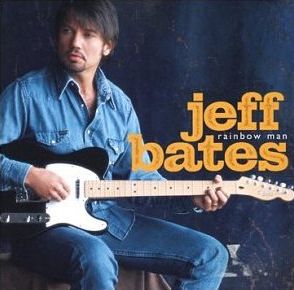 |
"I know
you may doubt it/ but if you stop and think about it/ there's one common
thing/ that we've all got/ people from all countries/ come here because/
they're hungry/ for what's cookin' in/ America's melting pot/ we're all
different, but the same/ red's the only colour in our vein."
Bates vividly recalls his childhood at Bunker Hill - a town of about 30
or 40 families.
"There was one little country store five or six miles from our house,"
says Bates.
Bunker Hill consisted of an old wooden school building, eventually torn
down and replaced by a church.
"She knew a lot of those old gospel songs," Bates says of his
adoptive mother.
"We spent a lot of hours together waiting on the porch for daddy
to come in from work. We were singing those songs together."
And also listening to country artists like Webb Pierce and David Houston.
"Our radio didn't work too good," says Bates.
"We lived in the woods. We lived a long way from a radio station.
No TV to speak of. We spent a lot of time listening or playing records.
She was a huge music fan, which helped me a lot. I loved music. It was
in my blood."
But he had to deal with school, for a while anyway, eventually bussed
30 miles to a school in Improve, before attending school in Columbia.
Bates showed plenty of promise as a child early on, becoming a straight-A
student
Being overweight, he was picked on.
"My daddy was working the logging business, and his health was beginning
to fail. He had a lot of trouble with his lungs. Right around every Christmas
as far as I could remember, he got sick. He got pneumonia. It got worse
and worse on him."
"I got in trouble one day," Bates recalls.
"I got into a fight on a bus, and I got suspended. When I got home,
I thought my daddy was going to give me a country butt whipping."
That is not exactly how it turned out.
Bates says his father told him, "I need you to work,' and there was
no point in going back, but I did real good in school. I got great grades."
Bates later did get a high school equivalency degree, but had some travelling
left to do.
NATIONAL GUARD
"I traded a 57 Chevy for my first guitar/ and daddy said I was crazy/ 'cause that was a helluva car/ when I played Love Me Tender on that Fender/ and music came pourin'/ out of my hands and heart/ he knew it was worth it/and so did I/ 'cause sometimes some things/ don't have a price." - My Mississippi - Jeff Bates-Kenny Beard- Dave Loggins.
Jeff had
never been outside of Marion County, Mississippi. Hungry to see the world,
he joined the National Guard.
That required about four months of training at Fort Leonard Wood in Missouri,
the first time the country boy had ever had been out of his county, let
alone the state.
The bluesy song My Mississippi cites his fondness for the state
along with some of his loves.
Like trading in a 1957 Chevy for his first guitar.
After that, he took a job on an oil rig.
One night, a friend urged him to get on stage at Colonial Steak House
in Columbia, Mississippi.
He sang Mark James penned Elvis hit Suspicious Minds, George Jones'
He Stopped Loving Her Today and Conway Twitty's I'd Love to
Lay You Down.
"The club owner came up to me and said, 'how would you like to work
here six nights a week? I'll pay you $50 a night,'" Bates recalled.
"I went in the next morning and quit my oil rig job."
WEDDING AND DIVORCE #1
That same
year Jeff fell in love and married a woman, nine years his senior, who
was a waitress at the club.
That stormy union lasted only a few weeks.
Because he was only 17, his mother had to sign off on the marriage.
"I came in from work two weeks after I got married."
He found a note left in a frying pan.
"It's not your fault. It's mine," the note said.
"It was a huge shock because where I come from, you didn't leave."
After the breakup, he moved to Seminary, Mississippi and became a carpenter
for a time, continuing to sing on the side.
Later on he became a welder, but music continued to be his first love.
Wanting to pursue his music more seriously, he moved to Little Rock, Arkansas.
It was there that he met and later married his first manager and in 1993
he formed his own band, Southern Storm.
"Southern Storm started travelling," Bates recalled.
"Eventually we played at least 30 of the 50 states, even Canada.
We decided we needed an album, so I started writing because I needed songs
for it. I wrote 10 and recorded them in Little Rock in 1995. The album
was called Country Is My Middle Name by Jeff Bates & Southern
Storm. I felt I was ready for Nashville, so we moved here in 1997. For
the first time in my life, I felt like I was at home. I really did. Nashville
challenged and inspired me."
Bates blossomed quickly once he began writing with Music City's tunesmiths.
His wife/manager, however, told him he'd be better off back in Arkansas.
So he moved back to his former hometown - a detrimental decision.
"I moved back to Little Rock, and it was all downhill from there,"
Bates said.
"I hated it. I felt like I had thrown away all the progress I had
made. I resented the whole thing."
DIVORCES #2 and #3
 |
As
his marriage began to unravel, Jeff started commuting to Nashville
to write more songs. "It was my fault. I made up my mind that I wanted to be in music, and I wanted to get a record deal. She was kind of scared to leave the town where we lived, Seminary, Mississippi. She didn't want to leave. I had someone tell me if I wanted to be Mickey Mouse, I had to go to Disneyland. I had to get as close to Nashville as possible." Bates signed to Warner-Chappell Publishing and did showcases in hopes of landing a recording contract. |
He moved
back to Nashville.
Everything seemed to be looking up, especially after he met Connie, who
he began to date and would later become his wife.
But by then Bates was using drugs.
He even sold all of his musical equipment to fund his drug habit. When
that money ran out he hit rock bottom, and the police found thousands
of dollars worth of stolen musical equipment at his home.
"I got arrested on March 14, 2001. They handcuffed me and took me
to jail. I looked like death. I hated myself. I didn't believe there was
a God. I didn't care if I lived or died. A couple of days later, when
I woke up straight for the first time in months, it dawned on me what
I'd done. I started calling everybody I'd stolen something from. I told
my wife everything. I told her to leave me, divorce me. I didn't deserve
her. I knew I'd lost it all. I'd wasted my life. That's when I met God
and started talking to him. I prayed, 'I know I've messed up. And I'm
not asking for anything except tell me what I'm supposed to do. Tell me
to go back to Mississippi and I'll go.' The next day, I found out that
Gene Watson had recorded two of my songs. And that Tracy Lawrence had
recorded a song of mine and Kenny Beard's called What a Memory.
I cried like a baby."
KENNY BEARD
Bates kept
in touch when he was in jail after having sold his guitar - Old Magic.
"Here's how I got my life back," Bates confessed.
"I called Kenny Beard while I was in jail. He had let me use Old
Magic, his prize guitar that he'd written so many of his hits on. I phoned
to tell him that I'd pawned it, to apologize and to tell him where it
was. He said, 'When you get out, I want you to promise to come and see
me.'" When I was released, I walked out and Connie was there. She'd
stuck with me.
The next morning, I went to Kenny Beard's. He met me at the door with
Old Magic in his hand. He said, 'Here, take this and write songs with
it. There's the case with the pawn ticket still in it. If you get the
hankering to do drugs, there's the pawn ticket to remind you. I love you.
Come on in and let's write.'"
Jeff worked pouring concrete building foundations for houses by day and
created new music by night.
He got his songwriting contract back and his tapes made their way to RCA.
On January 29, 2002, he sang for label executives.
"They asked about me. For the first time in my life, I was 100% me.
I sang my songs and told the truth about drugs, stealing and going to
jail. Everything. I stood up. Thanked them for their time and shook their
hands. Fifteen minutes after I walked in the front door back home, the
phone rings and they tell me that RCA wants to give me a deal."
This is more than a second chance to Jeff Bates. This is redemption and
salvation.
He has been to the bottom, but now he looks to the sky. His story isn't
always pretty, but the cold, hard truth seldom is.
"What I want to bring to country music is realism," says Jeff
Bates.
"I'm trying to get as real as it is, as real as you want to get."
That's what country music used to be all about. With this artist, it still
is.